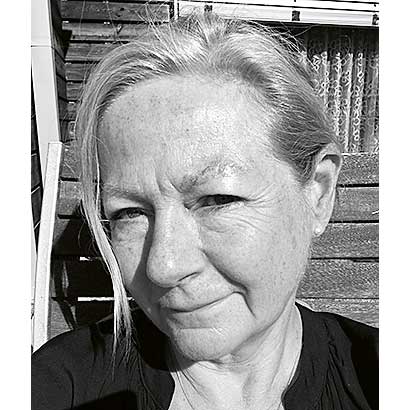All students who started the F–3 teacher training programme (for pre-school and grades 1–3) at Södertörn University in autumn 2021 were given a subscription to an audiobook service for the whole duration of the programme. In return, they were required to listen to at least one book per month and report back on what they had listened to.
“At many universities and colleges, teachers say that their students have insufficient language skills, that they cannot write and do not understand what they read,” says Boel De Geer, a senior lecturer in Swedish at Södertörn University.

Boel De Geer
Senior lecturer in Swedish, Södertörn University
One way teachers can encourage students to develop their language skills is to get them to read novels. However, De Geer points out that many students have so much course literature that they feel they do not have time to read anything else. That is why the university chose to invest in audiobooks.
“In our region, Stockholm, most students have a fairly long commute to and from university compared with other student towns,” she explains. “We thought that this would give them opportunities to listen to audiobooks.”
The university’s vice-chancellor decided to try it out with a small group of students. The F-3 teacher training programme was chosen partly because it has had a high dropout rate.
“We believe that students often struggle because of their language skills, because they have difficulty reading and understanding what they read, and difficulty expressing themselves clearly. First and foremost, it is probably due to their vocabulary being too limited,” says De Geer.
The students have been allowed to choose themselves what they want to read from the supplier’s range of Swedish audiobooks – fiction, non-fiction or children’s literature, the latter of which is also important for future F–3 teachers. De Geer has then held seminars once a month, with half the time devoted to discussing the books.
“The students have recommended good books to each other and shared their impressions of the books. They were also asked to select five words or expressions that were new to them and explain to their classmates what they mean, how they are used in the book and how they could be used in other contexts.
She taught vocabulary during the other half of each seminar.
“It could be anything, for example Latin morphemes, figurative language or foreign words and expressions that we use in Swedish, such as per capita, vice versa and force majeure.”
During the four years that the project has been running, De Geer has interviewed around ten of the 50 students taking part. She says that they have enjoyed the project, learned a lot and gained greater linguistic awareness.
”They also feel that they have acquired strategies for dealing with linguistic challenges. They know that they can perform a morpheme analysis or figure out the meanings of words. The point of this kind of a strategy is that they will then be able to pass this skill on when they start teaching.”
One advantage of audiobooks, she says, is that the students have improved their pronunciation. At the same time, they miss out on spelling, compared with traditional reading.
“There is research that shows that listening to audiobooks develops vocabulary, in exactly the same way as when parents read to their children. It has also been shown that it makes no difference to language comprehension whether you encounter a text in writing or hear it.”
The students who participated in the trial graduated this spring. De Geer believes that the audiobook project had a positive impact on their results.
“When you go into the Ladok student registry and look at these students’ independent work, you can see a difference in quality. There have also been significantly fewer comments and corrections regarding the language in their work. This may not necessarily be due to the audiobook project, but we would like to hope that it is,” she says.
She tells us that the audiobook subscriptions cost around SEK 20,000 per academic year for the entire student group. Including teaching time, she estimates that the total cost for an academic year is approximately SEK 80,000 for a group of 40 to 60 students. She has spent around 40 hours per term on the project, but says that it has not felt like an extra burden, but rather enjoyable. The response from the students has also been valuable.
“Students who previously hated reading books now enjoy it,” she concludes.
Another way to get students interested in reading is through book clubs. Malmö University is launching its tenth book club this autumn term. The aim is to improve reading skills, build social networks and bring culture and literature into the students’ everyday lives, says Karolina Rosenqvist, the project manager for the initiative, which is called Mau reads.

Karolina Rosenqvist
Project manager, Mau reads
The university organises two book clubs per term, one in Swedish and one in English, led by staff from the university library. The first meeting is a start-up session, where the group meets, the book is handed out and the librarian explains the format. After two further discussion meetings, when half and then the whole book is to have been read, the book club concludes with a discussion with the author of the book the group has just read. The discussion is open to the public, but the students also have a private question and answer session with the author.
The author meeting is led by someone from the university, usually a researcher, who links it to ongoing research. Authors who have participated include Susanna Alakoski, Liv Strömquist, Nicolas Lunabba and Patrik Lundberg.
“The books are often relevant to the occupational programmes we offer, such as police, social work, criminology, preschool teaching, teaching and nursing,” says Rosenqvist. “That means that when talking about perspectives in the book, the discussion often becomes a form of professional reflection.”
A total of 50 places is available for each book club, and they are allocated on a first come, first served basis. The students are then divided into smaller groups, with participants from a mix of different programmes.
“If the students end up working in the field they are studying, they will actually be working together in the future. But they have quite different roles. This has led to some very exciting discussions. What does it mean, for example, that a police officer needs to have a different approach than that of a social worker?”
In the university’s evaluations, students say that the book clubs encourage them to read more fiction on their own. Many also appreciate meeting and getting to know students from other programmes.
The book clubs do not award academic credits, and the meetings take place in the students’ free time.
“One important part of this is that the time that students spend at our university is about more than just education,” says Karolina Rosenqvist.
Boel De Geer’s tips on audiobooks
- – Include some form of organised follow-up to ensure that students are really listening, and listening actively.
- – Create teacher-led opportunities to build awareness of words and language.
- – Start small, especially if seminars are to be included, as these require staff.
Karolina Rosenqvist’s tips on book clubs
- – Hold the meetings in person.
- – Mix groups so that they consist of students studying different subjects and participants do not hang out with their usual crowd.
- – If you include a discussion with the author, it may be a good idea to make part of that meeting closed to the public while allowing some of it to be open. This will allow you to involve others who have not participated in the book club.


















